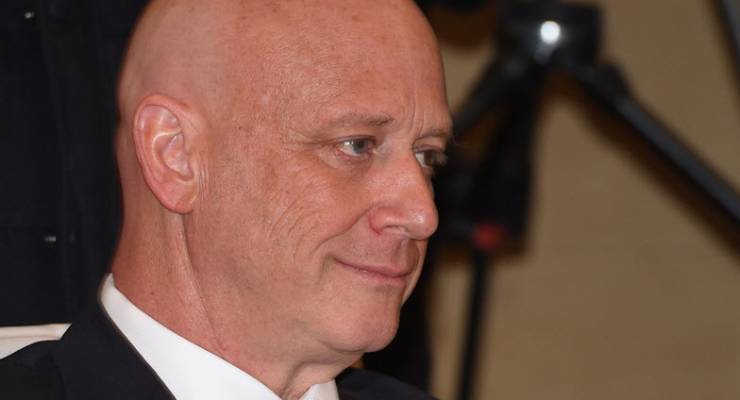
AGL CEO Andrew Vesey
Now that we’re all ex-neoliberals — and not a moment too soon — watch for some of the bad aspects of pre-Hawke-Keating era economic policy to reassert themselves. One of which is that, now that government intervention is becoming fashionable again, it’s much easier for governments to play favourites.
In sectors like media, of course, government have never stopped playing favourites, but by and large it’s harder to do so when your primary economic setting is to keep governments out of markets. That’s now coming to an end, at least in some areas — don’t expect too much interventionism from the government on wage stagnation, for example — it’ll be limited to the rather pathetic sight of Scott Morrison yesterday suggesting, ever so politely, that wouldn’t it be nice if corporate Australia were to share a little of its profits with workers.
But in energy, there’s none of that hands-off echo of the neoliberal era, when governments slunk around obsequiously asking companies what they could do for them (we exaggerate… a little). And especially not if you’re AGL and you’ve incurred the wrath of the Coalition for not expertly matching the many policy twists and turns of a government that is conflicted on power that on the weekend its energy minister bagging his erstwhile Cabinet colleague, the former and perhaps future resources minister, for calling renewables a “short term sugar hit” (whatever that actually means).
So AGL’s Andy Vesey travels to Canberra today to be hectored about Liddell power station, despite — as Crikey reported last week — the Australian Energy Market Operator making clear that any drop in supply from the closure of Liddell would be nearly entirely addressed by greater renewables capacity. The company has been the subjected to orchestrated attacks by the government in coordination with News Corp’s papers, all of which have been entirely political in purpose, and not least because AGL has the unmitigated gall to employ the partner of a Labor politician.
Now, markets are starting to be spooked by the government’s energy politicking. In its weekly global credit review, Moody’s pointed out that the actions of the Turnbull government had increased “the risk of an introduction of more intrusive regulation to curb retail prices in Australia.” Moody’s said:
“We estimate that AGL’s and Origin’s earnings will decline by as much as the mid-single-digit percent range, assuming that all of their consumers currently on standard contracts switch to discounted contracts. Such declines will increase their financial leverage ratio, as measured by funds from operations/debt, by 1.0-1.5 percentage points. A lot will rest on how many retail customers choose the discounted contracts, and whether other retailers will actively compete for these customers by offering their own discounted products.”
Moody’s was relaxed about the overall long-term impact on energy companies, noting “more than half their earnings derive from activities not affected by the discounting, including wholesale power generation, gas retail and liquefied natural gas exporting. Over time, AGL and Origin may also recover some of the lost revenue by paring back their average discounts, if competition from smaller second-tier retailers declines …”
But it shows how quickly the policy environment has changed that such a warning from Moody’s garners little or no attention in a country where, until recently, if a politician merely looked askance at a business leader there’d be op-eds about “sovereign risk”, and prominent companies can be publicly thugged by the government with nary a word from the Business Council or some other assembly of the corporate great and good.
In the new era of government interventionism that we’re all now signed up for, it pays to remember that it’s not just governments intervening, but politicians. And politicians rarely do anything without some political calculation involved.








Five years before Liddell belches it’s last – and all this fossil fooled government wants to do is flounce around like a fart in a bottle – playing ideological King Coal games?
This governement has known of AGL’s intentions to close Liddell since 2015 for goodness sake
Well, fancy that…a member of the business community doing something about global warming!
Let’s hope Vesey stays on message!!
The only power Turnbull is interested in is his own continuing.
He can do nothing about Jethro’s legitimacy, stagnating wages, unaffordable homes and unaffordable health insurance – but he can slip into his socialist onesie, jump up and down looking like he’s doing something about “power prices” (while blaming Labor – and ignoring the role of the governments he’s been part of in – for how we got here) and while “putting business and $tax their way” of the fossil fool industry?
Meanwhile his Neaderthal Party parners, having grown up with coal and it’s cargo cult beneficence are finding it hard to kick the habit and their benefactors?
When the smarmy gHunt was impersonating an Environment Minister he took a delight in using his high school debating tactics to lie so cleverly that few interviewers could keep him honest.
He clearly didn’t care that we knew that he knew that he was full of B/S.
Unlike Josh Frydembergs as he tries to claim black-is-white about whatever Talcum’s latest brain fart compels him to defend.
He looks so depressed and his awful delivery, in a voice with the timbre of a hammer of wet, rotten wood almost makes me feel sorry for him.
Almost, but not enough not to despise him.